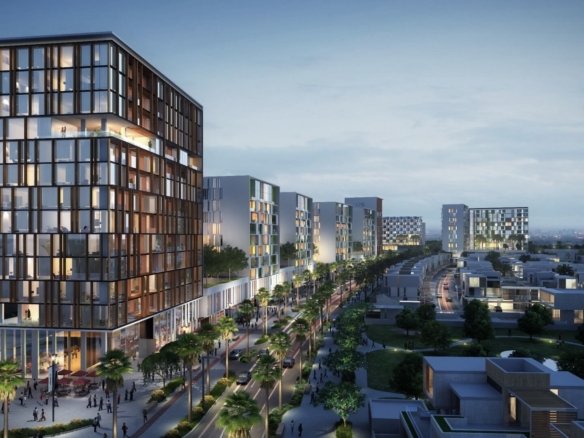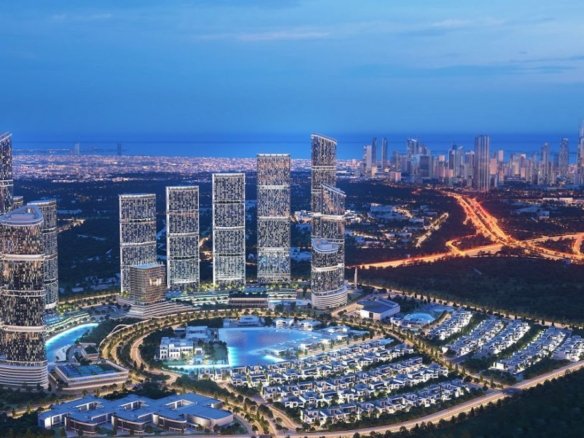Introduction
Dubai, a global leader in innovation and smart city initiatives, is once again at the forefront of a transformative trend in real estate: the tokenization of real estate in Dubai. This cutting-edge approach leverages blockchain technology to convert traditional property ownership into digital tokens, opening up new avenues for investment and making property accessible to a wider audience. It’s a significant leap towards fractional ownership Dubai, potentially revolutionizing how we buy, sell, and invest in properties.
This article will delve into the exciting world of real estate tokenization Dubai. We’ll explain what it is, explore its immense benefits, discuss the regulatory landscape including DLD tokenization rules, and assess whether this truly is the future of property investment. If you’ve ever wondered how to invest in property with crypto or own a fraction of a high-value asset, read on.
What is Real Estate Tokenization Dubai?
Real estate tokenization is the process of converting ownership rights in a physical property into digital tokens, recorded on a blockchain ledger. Each token represents a specific, verifiable share or interest in the underlying property.
Imagine a luxury villa valued at AED 10 million. Instead of needing to buy the entire villa, it could be “tokenized” into 10,000 digital tokens, with each token representing AED 1,000 worth of ownership. These tokens can then be bought, sold, or transferred digitally, much like trading shares on a stock exchange.
This concept brings fractional ownership Dubai to the digital age, enabling multiple investors to collectively own a single, high-value asset that would traditionally require substantial capital. Smart contracts, which are self-executing codes built into the blockchain, automate rules for token transfers, dividend distribution (e.g., rental income), and compliance.
Benefits of Blockchain Real Estate and Tokenization
The integration of blockchain real estate through tokenization offers numerous advantages for investors and the market as a whole:
- Fractional Ownership: Lower Entry Barriers: Traditionally, real estate investment demands significant capital, making it inaccessible to many. Tokenization allows investors to buy a small percentage of a property, democratizing access and enabling participation with smaller budgets (some platforms offer shares from as low as AED 2,000 or AED 5,000).
- Enhanced Liquidity: Real estate is notoriously illiquid – selling a property can take months. By converting properties into digital tokens that can be traded on regulated exchanges, tokenization brings stock-like liquidity to property investments. Investors can exit positions more quickly, without waiting for a lengthy traditional sale process.
- Global Investor Access: Blockchain removes geographical barriers. Investors from anywhere in the world can access Dubai’s property market via digital platforms, increasing international investment inflows and expanding market reach.
- Lower Transaction Costs: Smart contracts automate many aspects of real estate transactions, from ownership transfer to income distribution. This reduces reliance on intermediaries such as brokers, notaries, and escrow agents, thereby potentially lowering transaction fees.
- Transparency and Security: All token transactions are recorded on a tamper-proof blockchain ledger, offering end-to-end traceability. This improves trust, enhances due diligence processes, and significantly reduces the risk of fraud.
- Operational Efficiency: Real-time record-keeping and automated compliance checks through smart contracts streamline processes like investor onboarding, dividend distribution, and regulatory reporting for all stakeholders.
- Diversification: Investors can easily diversify their portfolios by owning small fractions of multiple properties across different locations and asset types (residential, commercial), spreading risk and optimizing their investment strategy.
- Programmable Income Distribution: Rental income or sales profits can be distributed automatically to token holders via smart contracts, providing a seamless and efficient return mechanism.
DLD Tokenization Rules and the Regulatory Landscape
Dubai is taking a proactive and regulated approach to real estate tokenization. The Dubai Land Department (DLD), in collaboration with the Virtual Assets Regulatory Authority (VARA) and the Dubai Future Foundation (DFF), launched a pilot phase of the ‘Real Estate Tokenisation Project’ in March 2025 under the Real Estate Evolution Space Initiative (REES). This positions DLD as the first real estate registration entity in the Middle East to adopt blockchain-based tokenization on property title deeds.
Key Aspects of DLD Tokenization Rules and the Regulatory Framework:
- Pilot Program: The initial phase is a limited pilot involving select participants approved by both DLD and VARA. This allows regulators to test the framework and gather insights.
- Legal Framework for Fractional Ownership: Dubai’s property co-ownership laws already support fractional ownership Dubai. Co-investors must register their shares with the DLD, and contracts must clearly outline rights, dispute resolution, and profit-sharing ratios.
- VARA Oversight: VARA is the designated authority for regulating virtual asset (VA) activities in Dubai (excluding DIFC). This means platforms and entities offering tokenization services must be licensed by VARA and comply with its regulations, including anti-money laundering (AML), Know Your Customer (KYC) measures, and investor protection protocols.
- Compliance & Transparency: All transactions are expected to adhere to stringent AML and KYC procedures. Blockchain platforms must offer transparency and security.
- SPVs (Special Purpose Vehicles): Often, a Special Purpose Vehicle (SPV) or similar legal entity is established to hold the physical property, and tokens are then issued representing shares in this SPV. This structure ensures compliance with local laws.
- Integration with Traditional Systems: Solutions like Prypco Mint (launched by the DLD in May 2025) are directly integrated with government systems to ensure blockchain records stay in sync with traditional real estate ledgers, providing legal certainty.
- Future Vision: The DLD projects that tokenized real estate could account for 7% of Dubai’s total property transactions, valued at approximately AED 60 billion ($16 billion), by 2033. This aligns with Dubai’s Economic Agenda D33, which prioritizes innovation and digital transformation.
Important Warning: Consumers and market participants are advised to exercise extreme caution and verify the licensing status of all firms claiming to offer VA-related services. Engage only with platforms explicitly approved by DLD and VARA to ensure your investment is covered by consumer protection and market integrity measures.
How to Invest in Property with Crypto through Tokenization
While the pilot phase is limited, the future promises a streamlined process to invest in property with crypto via tokenization:
- Choose a Regulated Platform: Select a platform licensed and approved by DLD and VARA. Examples of companies active in this space include Prypco Mint (DLD-launched), SmartCrowd, GetStake, and collaborations by developers like DAMAC Group with blockchain platforms like MANTRA.
- KYC/AML Compliance: Complete the necessary Know Your Customer (KYC) and Anti-Money Laundering (AML) checks, which are standard for any financial investment.
- Select Property: Browse available tokenized properties and select one or more assets that align with your investment goals.
- Purchase Tokens: Use fiat currency (AED) or potentially approved cryptocurrencies (like USDT, BTC, ETH via licensed conversion gateways) to purchase the desired number of tokens. Note: While Dubai is crypto-friendly, direct crypto-to-property transfer is not yet legal tender. Crypto is converted to AED through authorized exchanges.
- Receive Ownership: Once the transaction is complete, the tokens representing your fractional ownership Dubai property are recorded on the blockchain, and you receive proof of ownership.
- Manage & Earn: You’ll receive your share of rental income automatically via smart contracts. You can also monitor your investment’s performance and potentially trade your tokens on secondary markets to realize capital gains.
Pros and Cons of Real Estate Tokenization Dubai
| Pros | Cons |
| Lower Entry Barrier: Invest in prime properties with smaller amounts (e.g., from AED 2,000 – AED 5,000). | Regulatory Evolution: While proactive, the framework is still evolving, requiring investors to stay informed. |
| Increased Liquidity: Easier to buy and sell fractional shares compared to traditional real estate. | Limited Property Selection (Currently): Pilot phase means fewer properties are available for tokenization now. |
| Global Accessibility: Anyone from anywhere can invest, broadening market reach. | Technological Risk: Reliance on blockchain platforms and smart contracts introduces new technical vulnerabilities. |
| Enhanced Transparency & Security: All transactions immutable on blockchain, reducing fraud. | Market Volatility (Crypto): If paying with crypto, volatility can impact initial investment value before conversion to AED. |
| Diversification Opportunities: Easily spread investment across multiple properties. | Valuation Complexity: Valuing individual tokens can be more complex than valuing a whole property. |
| Reduced Transaction Costs: Automation via smart contracts can cut out intermediaries. | Tax Implications (Home Country): Investors must consider tax obligations in their home country for crypto disposal or property gains. |
| Passive Income: Automated distribution of rental income. | Platform Risk: Dependence on the security and management of the tokenization platform. |
Is Real Estate Tokenization Dubai the Future of Property Investment?
Dubai’s proactive stance and the immense benefits it offers suggest that real estate tokenization Dubai is indeed a significant part of the future of property investment. It aligns perfectly with Dubai’s vision for a smart, digitally-driven economy and its aim to attract global tech innovators and investors.
The ability to offer fractional ownership Dubai properties, combined with enhanced liquidity, transparency, and global accessibility, has the potential to transform real estate from a niche investment for the wealthy into a truly democratic asset class. As DLD tokenization rules continue to mature and more properties become available, this innovative approach will undoubtedly reshape investment strategies in the emirate. It’s an exciting time to invest in property with crypto or simply smaller amounts of fiat, leveraging blockchain’s power.
Frequently Asked Questions (FAQs)
Q1: Can I directly invest in property with crypto in Dubai?
A1: While Dubai is crypto-friendly, cryptocurrency is not yet recognized as legal tender for direct property transactions. You generally cannot directly transfer Bitcoin or Ethereum to buy property. Instead, you convert your crypto into UAE Dirhams (AED) through licensed crypto exchanges or OTC desks before completing the property purchase, ensuring compliance with VARA and AML/KYC regulations.
Q2: What is the minimum investment for fractional ownership Dubai?
A2: The minimum investment for fractional ownership Dubai via tokenization platforms can be significantly lower than traditional property purchases. Some platforms offer shares starting from as low as AED 2,000 to AED 5,000, making high-value properties accessible to a wider range of investors.
Q3: How do DLD tokenization rules protect investors?
A3: DLD tokenization rules, in collaboration with VARA, protect investors by requiring platforms to be licensed and compliant with strict AML/KYC protocols. They ensure transparency through blockchain records, regulate the underlying assets, and establish a legal framework for fractional ownership Dubai, providing investor confidence and recourse.
Q4: Which properties are currently being tokenized in Dubai?
A4: The real estate tokenization Dubai pilot phase (launched March 2025 by DLD) involves select properties. Companies like Prypco Mint (DLD-launched), SmartCrowd, and GetStake are active in tokenizing properties, and some major developers like DAMAC Group have announced plans to tokenize billions worth of assets. Currently, the initial focus is often on ready-to-own properties.
Q5: Will real estate tokenization replace traditional property ownership in Dubai?
A5: It’s unlikely to replace traditional ownership entirely, but rather complement it. Real estate tokenization Dubai is expected to become a significant alternative, especially for investors seeking fractional ownership Dubai, increased liquidity, and diversification. It will likely coexist with traditional property transactions, expanding market opportunities.
Ready to Explore Real Estate Tokenization Dubai?
Real estate tokenization Dubai is rapidly emerging as a groundbreaking method to invest in property with crypto or smaller amounts, democratizing access to Dubai’s lucrative real estate market. With robust DLD tokenization rules and the innovative spirit of the emirate, it truly represents the future of property investment.
Our expert team at dubaioffplan.ae is closely monitoring these developments. We can provide you with the latest information on regulated platforms, eligible properties, and guide you through the exciting new opportunities in blockchain real estate.
Ready to be part of the future of property investment? Get a free consultation with a real estate tokenization expert and receive exclusive insights into this evolving market. Click here to book your call!





Join The Discussion